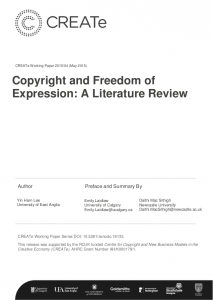Yin Harn Lee, with preface and summary by Emily Laidlaw and Daithi Mac Sithigh (2015)
Preface
The relationship between copyright law and freedom of expression has always been controversial, but this tension has deepened in recent years with the emergence of the digital environment and expansion of copyright law. As part of CREATe’s theme on human rights and the public interest, our project explores the relationship between freedom of expression and copyright, including how it has changed over time and/or depending on the business model, and whether freedom of expression needs to be reconceived in relation to copyright.
We are pleased to publish this literature review on copyright and freedom of expression. The review has been expertly researched and written by Dr. Yin Harn Lee, who was employed by the University of East Anglia while completing her doctoral studies at the University of Cambridge. Her report is the result of an extensive period of research, and regular conversations with and reviews by us. She has compiled a remarkable range of materials from around the world (both from courts and scholars), and sets out clear examples of what happens when these areas of the law meet. This review traces the nature of the debates about the interaction between copyright and free speech, treatment by the courts (focusing namely on UK (in its wider European context) and USA jurisdictions), specific scenarios where the issues are particularly acute, and current proposals for reform.
It is our hope that this literature review provides insight to the reader on what is an incredibly uncertain area of the law. We invite you to read this literature review and provide us with your comments to help inform the second stage of this project.
From our end, the literature review has certainly been revealing about the extent of the lack of coherence in law (both statutory and case law) concerning the nature and extent of a person’s right to use a third party’s copyrighted work under the umbrella of fundamental rights. It is questionable at this stage whether there is any such right in substance, although the framework is there in law. When courts have engaged with freedom of expression it is often not in the most direct fashion – especially when disputes arise within the terms of copyright law, as they are likely to be litigated on that basis by experts in that field. The human rights implications typically emerge at a late stage or in subsequent academic writing.
Our objective is twofold. First, one question that emerged consistently in the literature review is whether an independent ‘free speech’ exception is needed to give fulsome protection to the right and/or to facilitate new business models that depend on speech, and if so, what the nature and contours of such an exception should be. It is recognized that this is a vexed question and part of the interrogation requires consideration of the power of fair use and fair dealing provisions, however crafted, to adequately cover such rights, and the balance required with the property and other rights of the creators. The second goal is to translate the knowledge contained in the literature review into practical advice for businesses and lawmakers on how to reconcile copyright and human rights law. Later in 2015 we will convene a workshop, where these matters will be discussed in more detail culminating in the publication of an impact assessment tool, informed both by this review and the outcomes of our workshops.
Download Copyright and Freedom of Expression: A Literature Review.

